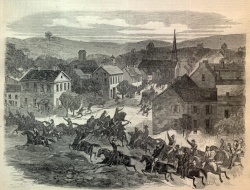Difference between revisions of "Portal:Inalienable Rights"
m |
(Replacing introduction placeholder text and a few other minor edits) |
||
| Line 4: | Line 4: | ||
<table width="100%" border="0" style="border-bottom:1px solid #000080;" cellpadding="0"> | <table width="100%" border="0" style="border-bottom:1px solid #000080;" cellpadding="0"> | ||
<tr><td style="padding:5px;"> | <tr><td style="padding:5px;"> | ||
| − | The | + | American independence owes much to English Common Law. The majority of the colonists were English who would eventually insist on being treated as English subjects in that, English subjects enjoyed rights that were conferred by the English constitution. And the English constitution rested on Common Law. From the beginning of the English colonies in America, there was conflict between the interest of the colonists and the interests of the English crown and the chartered companies behind the colonies. Parliament created a number of Acts that regulated and taxed colonial trade in ways that were expensive for the colonists - and, in which, the colonists had no voice. For more than a century, these conflicts could be, and were, ignored when they interfered too greatly in the ability of the colonists to pursue their economic interests. In the mid 18th century, a point was reached at which one or the other would have to prevail. In that time leading up to American independence, influential arguments were made in colonial court cases pressed by English authorities that relied less on specific legal arguments and more on appealing to the rights conferred by English Common Law. The colonists wanted the rights of subjects living in England. They had little interest in independence until it appeared to be the only way to achieve them. |
| − | + | This portal is the place to assign categories and pages that present and discuss the link between American independence and English rights. | |
| + | </td> | ||
<td>[[File:MorganWashington.jpg|250px|link=]]<br> | <td>[[File:MorganWashington.jpg|250px|link=]]<br> | ||
<hr> | <hr> | ||
| − | <p style="font-size:80%">Morgan's Raiders entering Washington, Ohio in August, 1863</p> | + | <p style="font-size:80%">Morgan's Raiders entering Washington, Ohio in August, 1863<br><b>This Civil War image is a placeholder.</b></p> |
</td></tr> | </td></tr> | ||
</table> | </table> | ||
| Line 25: | Line 26: | ||
<h2 style="border-bottom:none;margin-top:8px;margin:0;background:#000080; font-size:120%; font-weight:bold; text-align:center; color:#FFF;">Things you can do</h2> | <h2 style="border-bottom:none;margin-top:8px;margin:0;background:#000080; font-size:120%; font-weight:bold; text-align:center; color:#FFF;">Things you can do</h2> | ||
Here are some things you can do: | Here are some things you can do: | ||
| − | *Write (or edit) a page about about [[Inalienable rights|inalienable rights]]. What are inalienable rights? | + | *Improve the introduction above (text and image). |
| − | + | **Find a good image to represent the portal. | |
| + | *Write (or edit) a page about about [[Inalienable rights|inalienable rights]]. What are inalienable rights? Their connection to Common Law? What did the concept mean to American independence? | ||
*Thing 3 | *Thing 3 | ||
</div> | </div> | ||
Revision as of 21:31, 25 January 2014
Our Common Law Heritage
|
American independence owes much to English Common Law. The majority of the colonists were English who would eventually insist on being treated as English subjects in that, English subjects enjoyed rights that were conferred by the English constitution. And the English constitution rested on Common Law. From the beginning of the English colonies in America, there was conflict between the interest of the colonists and the interests of the English crown and the chartered companies behind the colonies. Parliament created a number of Acts that regulated and taxed colonial trade in ways that were expensive for the colonists - and, in which, the colonists had no voice. For more than a century, these conflicts could be, and were, ignored when they interfered too greatly in the ability of the colonists to pursue their economic interests. In the mid 18th century, a point was reached at which one or the other would have to prevail. In that time leading up to American independence, influential arguments were made in colonial court cases pressed by English authorities that relied less on specific legal arguments and more on appealing to the rights conferred by English Common Law. The colonists wanted the rights of subjects living in England. They had little interest in independence until it appeared to be the only way to achieve them. This portal is the place to assign categories and pages that present and discuss the link between American independence and English rights. |
 Morgan's Raiders entering Washington, Ohio in August, 1863 |
CategoriesClick on arrows to see subcategories and articles. Things you can doHere are some things you can do:
|
Sand Box
|